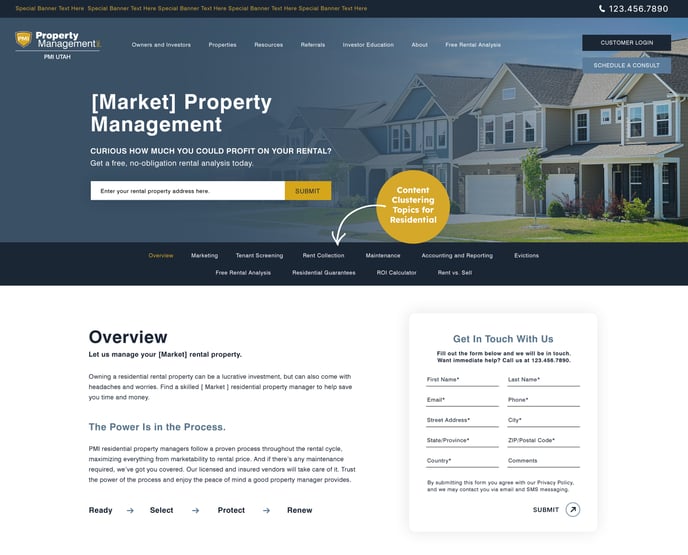How does content clustering help get me found on Google?
Content clustering was designed to help you organize your content, keeping users on your website longer, improving your search engine rankings, and overall increasing your attraction to potential owners.
What is Content Clustering?
Content clustering expands on the property management lifecycle, such as marketing, tenant screening, rent collection, and more. Having this type of content on your website increases keyword density and overall could improve your onsite SEO. It can also help you get found on Google!
Clustering your content together makes for happier website visits and happier search engines. When website visitors can find the information they are looking for on your site, they stay longer, enjoy their experience, and view you as an industry expert. Search engines determine your authority based on having relevant pages on a specific topic, and you can link your hub page to your homepage. This moves the page up in the hierarchy of your site.
Content clustering was designed to help you organize your content, keeping users on your website longer, improving your search engine rankings, and overall increasing your attraction to potential owners. When all of these things work together, they result in increased leads!
Where Can I Find Content Clustering on my Website?
We've added content clustering topics to ALL service pillars for PMI and they can be found on your main services pages and even linked in the navigation!
Each topic will link to a page that details specific services around the sub-functions of property management.

Why Content Clustering is Important
Content clusters are important largely in part due to the evolution of Google’s algorithm and the way we approach search engine optimization strategy today. Long gone are the days of keyword stuffing. As Google has advanced its algorithm and machine learning technology, the need to be topically relevant has become increasingly important.
Google RankBrain
The introduction of Google’s machine learning technology, RankBrain has completely transformed the way Google returns search results. Before, Google used to return search results based specifically on the keywords you were searching for. Now, their algorithm has a more robust understanding of the topic you are searching for and looks to return the content that it deems the most relevant.
Google is focused on topics, relevant associated terms and word variations. Voice search has been another product that has helped propel the need to adjust SEO to content clustering where applicable.
Benefits of Content Clustering
Linking your content together has important benefits that cannot be overlooked.
-
Happier customers. When people visit your site for information, it’s helpful to have all related topics grouped together. Customers stay longer, enjoy their experience, and view you as an industry expert.
-
Happier search engines. The search engines appreciate clusters of content. Authority comes from having many relevant pages on a specific topic, and you can link your hub page to your homepage. This moves the page up in your site’s hierarchy.
Understand User Intent
-
What does the user want?
-
What is the user looking for?
-
Based on that intent, what would the user be most likely to convert on?
-
What type of action might the user intend to take?
-
What type of next steps would the user be interested in?
Stop Competing With Yourself!
Think of it this way: when you have all of your content clustered together, you’re creating a ‘megasite’ in a sense and showing that you have an authority on a certain topic. If you see that someone has 20 pages all about property management, you’d reasonably assume that they know a lot about it, right? Google does the same thing. That one page that links to all ancillary pages, over time, will increase in rankings as an authority page. And like a rising tide that lifts all boats, all these related pages that link to each other will get a boost when the main authority page gets a boost.